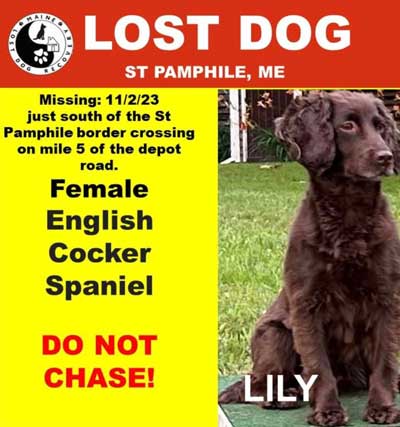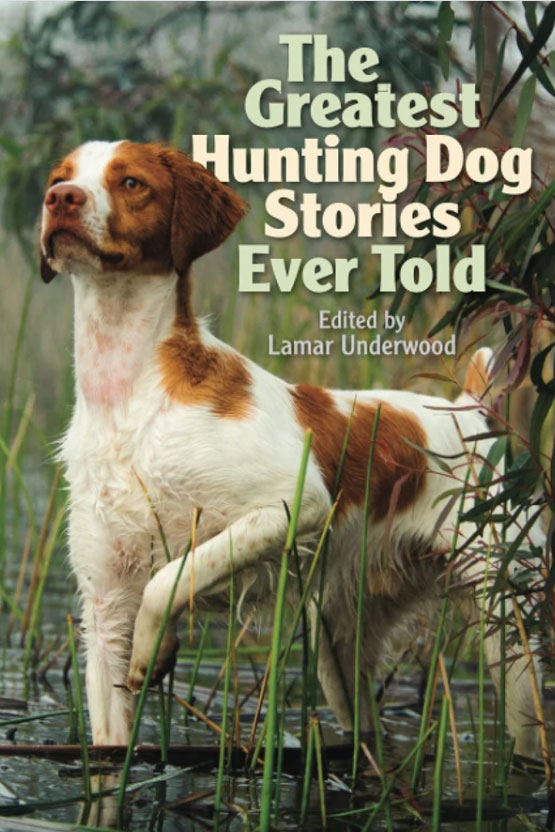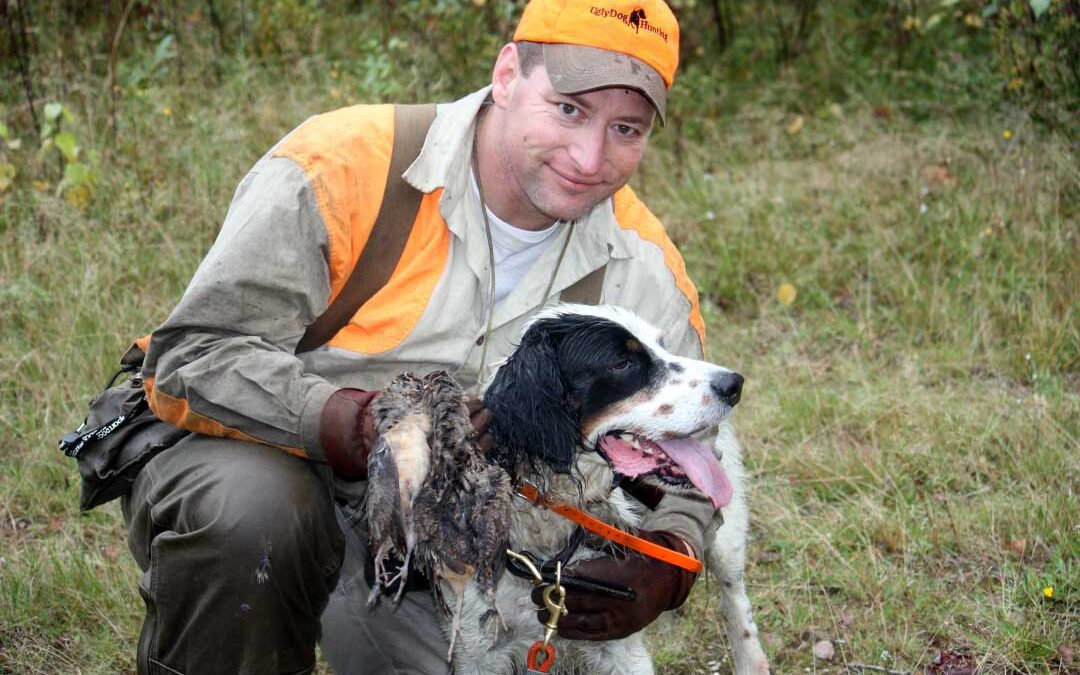Nothing about pulling a kennel from the back of my pickup and placing it on the ground in the jack pines’ shadows felt right. Tossing in a stinky t-shirt in the kennel was something you do with puppies not adult dogs. Leaving bowls of chow and water next to the open door of the dog box was almost as odd as staring at the set up in my rearview mirror while driving away put me over the top. It’s what I’d have to do ’cause Albert was missing. If I didn’t find him, I’d have to tell his owner that I was the one who lost him, and I couldn’t imagine how my daughter Morgan would react hearing that news.
Albert was a big runner, and he started the cover by running at a high pitch. He stayed just inside of bell range and, when the clanging stopped, I knew exactly where he was. He was at the bottom of the hillside near the bend in the stream. To get to him I’d have to wind my way through a white birch stand, zigzag downhill through the highbush cranberries, and look for him near the alders.
On my way a grouse punched out of a tree and teased me with a wide-open straightaway. I didn’t shoot because I could see Albert’s white coat and black and brown markings off in the distance. His high head and 12 o’clock tail looked so sharp that I could have sworn he was lit up by a ray of sunshine from Heaven. I would remember that point throughout the winter when the snow piled so far up my front door that I’d have to snake my way through a crack just to shovel the rest out.
The bird he was pointing was between me and him, and I walked straight toward his point. The bird flushed, a large female woodcock, and she towered up, up toward the sky. The last thing I remember was seeing the bird fold up, its silhouette dark against the backdrop of a bright blue sky. Albert broke and, when I heard his bell, I took my eye off the bird and yelled “Whoa!” He didn’t stop, so I yelled again. He didn’t respond to the collar, and he didn’t listen to the whistle and not long after I couldn’t hear the bell. I felt my stomach flip when I looked at the horizon. The sun was getting low, and that meant I’d be in for a long night.

Pat Keliher and his string of cockers are used to hunting the Maine woods in the snow. Photo: Pat Keliher
My friend Pat Keliher had it worse, for he had to spend four days in the frigid Maine woods. Pat’s the Commissioner of the Department of Marine Resources for the state of Maine, but he’s the furthest thing from a desk jockey. I guess his experience as a fishing and hunting guide in some of the most remote parts of the Pine Tree State gave him the credentials to land that job. But Pat had never lost a dog before, not even on a winter sea duck hunt in Casco Bay’s big seas, strong currents and near freezing water.
“For some reason our early November grouse hunt wasn’t coming together,” Pat said. “Several dogs contracted a respiratory illness and got so sick that they had to be quarantined. Then, one of crew got sick with Covid-19. Then I had a priority work issue pop up. At one point I wondered if we were ever going to pull out of the driveway, but we kept at it, and gradually everything got sorted and we headed for camp. We were four hunters with eight English cocker spaniels, one springer, a week’s worth of provisions and a lifetime’s worth of double guns.”
Not so fast, said the weatherman as a front moved in and stalled. “The first few days in the woods were rough,” Pat said. “We woke up to snow and freezing temperatures on our first and second mornings, and the grouse stayed up in the pines. Things warmed up on the third day, and we were upbeat when we pulled into Jed’s Jungle, a cover that always holds a lot of birds.
“We didn’t find a single grouse in our first mile, but my liver cocker Lily started making game a little bit after that. She bumped the first grouse of our trip, so I recalled her and settled her down. I cast her off, and soon enough she scented a second bird that flushed between me and my oldest friend and hunting buddy, Scott Westerlund. We both shot, the bird fell, and Lily, who is steady to wing and shot, broke before being released. She ran straight to where the bird dropped so I, considering the circumstances, forgave her. I thought we turned the corner and that things were about to improve.”
They didn’t, especially because what should have been an easy retrieve quickly turned into a nightmare. “After a few minutes, Lily hadn’t found the grouse, so I called her to me. When she was at my side I gave her a line. I whistled her to stop, handled her left, and then stopped her for a pause. I sent her farther to the left and she found nothing. I whistled her back in, took a line from Scott, and sent her back into the covert. I kept waiting for her to return with the bird, but when she didn’t return, I whistled her back. I whistled again, and then again. The woods were silent.”
 The area where Pat and his crew were hunting was rugged and there were coyote, lynx and bobcat sign everywhere. “We were so close to the Quebec border that we had terrible cell signal,” Pat said. “I connected with everyone I could ranging from the Maine Warden Service, the Border Patrol, hunters in the area and local folks. I made a lost dog post on several internet web pages, and we all kept searching for Lily. Near the end of the fourth day, we started getting calls and emails. The first two messages demanded the transfer of reward money to guarantee Lily’s release. There were so many such contacts that I began to wonder how the world got to be filled with so many cruel and evil people.”
The area where Pat and his crew were hunting was rugged and there were coyote, lynx and bobcat sign everywhere. “We were so close to the Quebec border that we had terrible cell signal,” Pat said. “I connected with everyone I could ranging from the Maine Warden Service, the Border Patrol, hunters in the area and local folks. I made a lost dog post on several internet web pages, and we all kept searching for Lily. Near the end of the fourth day, we started getting calls and emails. The first two messages demanded the transfer of reward money to guarantee Lily’s release. There were so many such contacts that I began to wonder how the world got to be filled with so many cruel and evil people.”

The Aubertin’s could not have been more helpful or gracious in exacting Lily’s return.
If it were not for hope our hearts would break, and that’s about when Keliher got a legitimate text from the Aubertin family. “The Aubertin’s live in Saint-Adalbert, Quebec, which was a long way from where we were hunting,” Pat said. “They sent a picture of Lily, didn’t ask for any money and wanted to return her to me. I couldn’t fathom how she traveled so far in below freezing weather without food or water for four days. Part of me wonders what happened, what caused her to move past the grouse and continue into Canada. At other times I’m just thankful that I have so many good people in my life who helped me to get her home.”

After a four-day search in the frigid Northwoods, both Keliher and Lily needed rest.
After searching for hours, I drove back to the kennel to see if Albert was curled up in the box. He wasn’t, so I piled into the bed of my truck to sleep for a bit. I didn’t make it long—a crick in my neck woke me up, but what was that sound in the distance? Was it a faint clang of a bell? I whistled into the darkness as loud as I could and over and over until I was as winded as I was when running football two-a-days. The sound clanged away, stopped and started back up again. Hope is being able to see that there is light in the darkness, and mine came in the form of a wet, muddy and bloody setter. Wet can be dried, muddy can be cleaned and bloody can be healed. And tomorrow? Well, it’s just going to have to be a brand-new day.
 All dogs live forever in the hearts of their owners. But hunting dogs take that love to ultimate dimensions of affection. Diversity reigns in this world. There are pointing breeds, retrievers, hounds. For many hunters, the work of the dog in the field is the real purpose of the hunt. The simple pursuit of a gamebird or animal is not the purpose of going afield. The dog work—the radar-nosed probing of cover, the searching gait to check out fields, the retrieving of downed birds—moments spent in these elements are the real reason hunters have bonded with their dogs. Buy Now
All dogs live forever in the hearts of their owners. But hunting dogs take that love to ultimate dimensions of affection. Diversity reigns in this world. There are pointing breeds, retrievers, hounds. For many hunters, the work of the dog in the field is the real purpose of the hunt. The simple pursuit of a gamebird or animal is not the purpose of going afield. The dog work—the radar-nosed probing of cover, the searching gait to check out fields, the retrieving of downed birds—moments spent in these elements are the real reason hunters have bonded with their dogs. Buy Now
